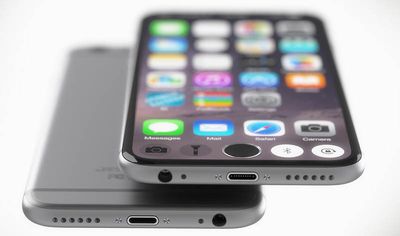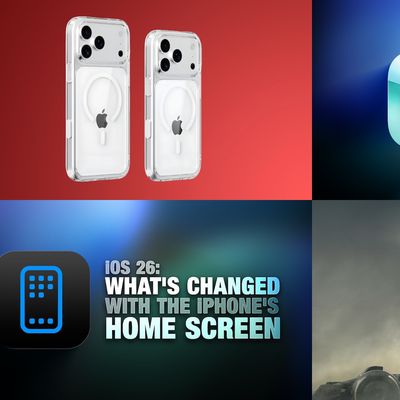Apple Orders Display Driver Chips From Synaptics for Next iPhones
Apple has placed LCD display driver orders with touchscreen supplier Synaptics for its next-generation iPhones, indicating the Cupertino-based company's in-house development of touch and display driver integration (TDDI) chips may have fallen behind schedule, according to Taiwanese website DigiTimes.

iPhone 7 concept with integrated Touch ID by designer Martin Hajek Synaptics
acquired Renesas SP Drivers, reportedly the sole supplier of LCD driver ICs for iPhones, in September 2014 in an effort to maintain orders from Apple, and for now it appears the iPhone maker will remain one of its customers. The supplier also works with Google, HTC, Microsoft, Samsung, Sony and other smartphone makers.
Apple previously recruited senior Renesas engineers to internally develop TDDI chips with Touch ID integrated into the display. The single-chip solution could allow for the Home button to be eliminated on future iOS devices, but Apple ordering regular display drivers from Synaptics indicates the technology may not be ready for the iPhone 7.
Apple has filed multiple patents for displays with integrated Touch ID and trackpad capabilities over the past few years, and the iPhone 7 lineup is due for a significant redesign, but it remains too early to predict whether Apple will ever remove its iconic Home button on future iPhones.
In March, Synaptics announced the first TDDI single-chip solutions for smartphones and tablets, allowing for thinner and brighter displays with best-in-class capacitive touch performance. The reduced number of components, fewer lamination steps and increased manufacturing yield of TDDI chips also lowers production costs.
Popular Stories
A new Apple TV is expected to be released later this year, and a handful of new features and changes have been rumored for the device.
Below, we recap what to expect from the next Apple TV, according to rumors.
Rumors
Faster Wi-Fi Support
The next Apple TV will be equipped with Apple's own combined Wi-Fi and Bluetooth chip, according to Bloomberg's Mark Gurman. He said the chip supports ...
Apple will launch its new iPhone 17 series in two months, and the iPhone 17 Pro models are expected to get a new design for the rear casing and the camera area. But more significant changes to the lineup are not expected until next year, when the iPhone 18 models arrive.
If you're thinking of trading in your iPhone for this year's latest, consider the following features rumored to be coming...
Apple's next-generation iPhone 17 Pro and iPhone 17 Pro Max are only two months away, and there are plenty of rumors about the devices.
Below, we recap key changes rumored for the iPhone 17 Pro models.
Latest Rumors
These rumors surfaced in June and July:A redesigned Dynamic Island: It has been rumored that all iPhone 17 models will have a redesigned Dynamic Island interface — it might ...
The long wait for an Apple Watch Ultra 3 is nearly over, and a handful of new features and changes have been rumored for the device.
Below, we recap what to expect from the Apple Watch Ultra 3:Satellite connectivity for sending and receiving text messages when Wi-Fi and cellular coverage is unavailable
5G support, up from LTE on the Apple Watch Ultra 2
Likely a wide-angle OLED display that ...
iPhone 17 Pro and iPhone 17 Pro Max models with displays made by BOE will be sold exclusively in China, according to a new report.
Last week, it emerged that Chinese display manufacturer BOE was aggressively ramping up its OLED production capacity for future iPhone models as part of a plan to recapture a major role in Apple's supply chain.
Now, tech news aggregator Jukan Choi reports...
The iOS 26 public beta release is quickly approaching, while developers have recently gotten their hands on a third round of betas that has seen Apple continue to tweak features, design, and functionality.
We're also continuing to hear rumors about the iPhone 17 lineup that is now just about right around the corner, while Apple's latest big-budget film appears to be taking off, so read on...






















